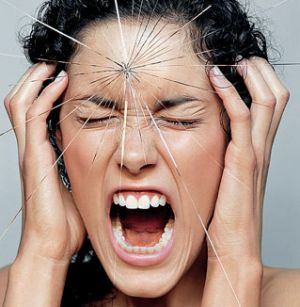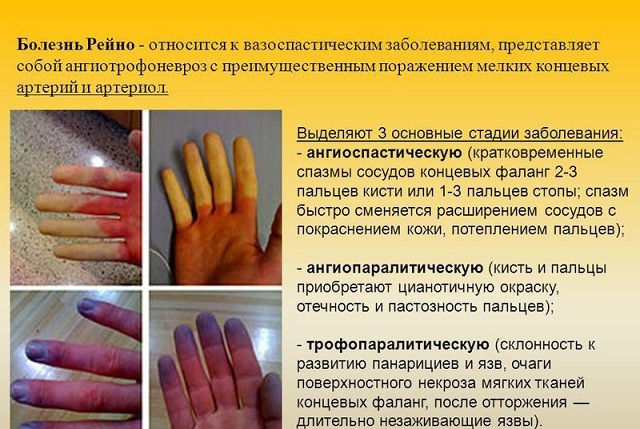 Negative emotions lie in wait for a modern person at every turn. Troubles in the family, problems at work, poor financial situation, inability to fulfill oneself - all this affects the nervous system.
Negative emotions lie in wait for a modern person at every turn. Troubles in the family, problems at work, poor financial situation, inability to fulfill oneself - all this affects the nervous system.
As a result, people become angry, grouchy, irritable and very quickly lose their temper. The breakdown of the nervous system provokes psychological tensions in relationships and chronic fatigue. No one is insured against the risk of earning a breakdown.
Consider the most common types of dysfunction of the nervous system.
Contents
- Neuroticians are everywhere
- Obsessive states as a subspecies of neurosis
- Hysteria
- Diseases of impaired perception
- Dysfunction of the autonomic nervous system
- Nervous psychiatric disorder
- Causes of neurotic disorders
- What does it look like from inside and from
- What is to be done, how to be? !
- Consequences of a lifetime
- Preventative measures
Neurotics are everywhere
The most common neuropathy is neurosis. The disease is divided into several subspecies, each of which is characterized by its symptoms and severity.

There are so many reasons in life that can lead to neurosis even the most calm person. Usually this happens in cases where stress occurs frequently. Neurosis manifests itself as a general depression of the condition. The patient is disturbed by sleep, tachycardia develops, fatigue occurs even after minor physical exertion.
Often the patient does not suspect that he has become a neurotic, so the disease does not heal and progress. Yes, it can disappear by itself, but this phenomenon is extremely rare.
Obsessive states, as a subspecies of the neurosis
Among obsessive compulsive states are also very common. This disease is preceded by a long depression and anxiety, which does not lag behind the patient a single step. Despite the fact that a person realizes the baselessness of his fears and fears, they do not leave his head.
Hysteria
 A patient with hysteria( hysterical neurosis) can change his mood every minute. The people around may think that this person does not have enough attention, and he tries to draw this attention to himself with all his might.
A patient with hysteria( hysterical neurosis) can change his mood every minute. The people around may think that this person does not have enough attention, and he tries to draw this attention to himself with all his might.
Fainting, scandals, hysterics - it used to be believed that this is how an ill-mannered person behaves, but modern medics are sure - a problem in a nervous breakdown.
In this disease, a patient can lose weight, develop tachycardia, the patient is sick with nausea and vomiting.
Disturbed perception disorders
These include:
- Illusions is a distorted perception of the world. They can be visual, auditory, tactile, tasteful. An example of illusion is the sound of dripping water, which is perceived as a conversation;a tree can be taken by the patient for the silhouette of a person. Illusions often develop with poisoning the body and infectious diseases, but sometimes they occur in healthy people.
- The hallucinations of are a perception of things that are not really there. Hallucinations are divided into: simple( noise, tapping, color spots);
 complex( voices, music, pictures, faces, objects).Sometimes patients hear any orders and obey them. Hallucinations can occur in a variety of diseases and are symptoms of psychosis.
complex( voices, music, pictures, faces, objects).Sometimes patients hear any orders and obey them. Hallucinations can occur in a variety of diseases and are symptoms of psychosis. - Hay fever is the transmission of signals from internal organs to consciousness. Symptoms of these disorders are expressed in unpleasant migratory sensations in the head, limbs, and chest. That is, people are concerned about pain, and doctors say that there is no obvious pathology.
Dysfunction of the autonomic nervous system
The disease can not be called a disorder of the autonomic nervous system, since no analysis will show any deviations from the norm, however, the person feels deeply sick, therefore, in the disorders of the NNS, treatment is necessarily required.
VNS consists of two departments: sympathetic and parasympathetic. If one of the departments fails, the whole body suffers.
The main symptoms of vegetative-vascular dystonia( GVD):
- rapid fatigue;

- frequent headaches;
- dizziness;
- skin becomes cold;
- increased blood pressure;
- sweating of the extremities.
Other signs of autonomic nervous breakdown:
- dyspnea;
- nausea;
- hand tremor;
- memory impairment( a person can not remember what he knows perfectly);
- dry mouth;
- sleep disorders;
- unfounded excitement.
Nervous psychiatric disorder
The fact that a person is mentally ill, others are judged by his inadequate behavior( laughter, tears, abuse, conversation with himself).
Thinking disorder is the second group of symptoms of a mental disorder:
- The pace of thinking can become so fast that a person will not be able to express the interlocutor their experiences and thoughts. From the speech, not only words, but whole phrases will fall out. This state is typical of manic-depressive psychosis.
- But the reverse process can also be observed - the inhibitory thinking of .The patient responds monosyllabically, while between the phrases there are large pauses.
- The viscosity of , which is also a sign of a mental disorder, is characterized by the length of the conversation. When a patient is asked to tell something, he stops very long on minor, minor details, and sometimes
 simply forgets the essence of the matter. It's very difficult to communicate with such people. Viscosity of thinking is a symptom of epilepsy or organic brain damage.
simply forgets the essence of the matter. It's very difficult to communicate with such people. Viscosity of thinking is a symptom of epilepsy or organic brain damage. - Resonance - a penchant for empty wisecracking and ranting.
- The severity of thinking - the patient speaks in separate phrases, so it is very difficult to understand.
Symptoms of thinking disorder are conventionally divided into delusional, obsessive and overvalued ideas. Obsessions arise from a person in addition to his desire, he understands their senselessness and tries to drive them away with all his might.
It can be annoying memories - more often unpleasant. A person can check several times: if the tap is closed, if the iron is turned off, although I am completely sure that everything is in order.
Causes of Neurotic Disorders
Scientists have been searching for the solution of neurotic disorders for many years. The causes of the pathological condition are put forward by physicians very different. However, most researchers tend to believe that the disease is transmitted at the gene level. That is, a patient in the family had a similar disease.
However, there are other causes that provoke neuroses and related disorders:
- adverse ecology;
- child psychological trauma;
- excessive mental and physical stress;
- stresses and problems in the family;
- depletion of the nervous system;
- is very busy at work;
- congenital tendency to fatigue;
- alcohol abuse and drug use.
How it looks from the inside and from the side of
Nervous disorder always has characteristic symptoms and is manifested by poor health or( and) the behavior of the patient. Signs of an organic nature:
- sleep disturbances( drowsiness, insomnia);

- dyspeptic disorders( nausea, vomiting, diarrhea, constipation);
- severe headaches;
- shortness of breath;
- memory dips;
- lack of libido;
- chronic fatigue;
- menstrual cycle failure in women;
- lack of appetite;
- panic attacks.
This is what the patient feels. Behavioral symptoms of a nervous system disorder are noticeable to others:
- a sharp change of mood;
- inadequate behavior;
- bouts of unrestrained anger;
- paranoid inclinations;
- worry;
- prolonged depressive state;
- excessive sentimentality;
- need for alcohol and drugs;
- suicidal actions.
What to do, how to be? !
 Unfortunately, nervous disorders progress with age, problems accumulate, resulting in a person can get a nervous breakdown.
Unfortunately, nervous disorders progress with age, problems accumulate, resulting in a person can get a nervous breakdown.
To fight neuroses you need to start when their first symptoms appear.
Treatment of disorders of the nervous system should start with a set of measures:
- from the diet should exclude strong tea, coffee;
- complete rejection of alcohol and drugs;
- the patient should drink herbal soothing teas;
- walks in the fresh air should be daily, despite the weather;
- welcome classes in the gym;
- you can visit the sauna or steam bath;
- is very useful for nervous disorders of massage;
- should take a bath with sea salt.
If these procedures do not help, the patient should seek help from a doctor who will conduct the examination and prescribe medication. The doctor will prescribe the patient antidepressants, sedatives or tranquilizers( depending on the condition).
Correction of nervous disorders depends on the degree of their severity. When the disease has an easy form, it may well disappear on its own if the person follows the rules listed above.
Of great importance in the treatment of nervous disorders are individual and group sessions with a psychotherapist. In some cases, the patient is shown physiotherapy procedures.
Consequences of a lifetime
If a person suffers from a nervous breakdown, his body is in constant tension, resulting in problems of a physiological nature. The expression "all diseases from nerves" is by no means groundless. 
The symptoms that lead to pathology are listed above. Prolonged tachycardia will invariably lead to wear of the heart, and a lack of energy will provoke hypodynamia and obesity.
The fight against stress is accompanied by an increase in blood pressure - a state extremely dangerous for life. Mental diseases can cause damage to the eyes, brain, kidneys.
A person who can not concentrate on any information and suffers from a memory failure can easily lose work, respect for colleagues and even family. Loss of self-esteem can lead a patient to suicidal or violent acts.
Stammering is the most common speech defect caused by a nervous breakdown.
Preventive measures
To protect yourself from these diseases a person must competently alternate work and rest. Even with urgent work, it is not possible for the  to neglect interruptions that increase work capacity.
to neglect interruptions that increase work capacity.
A healthy psyche can not be where there is a bad dream. Sleep need 8 hours a day - not less. To quickly fall asleep, you can not work at a computer, smoke, drink alcohol, watch thrillers or horror movies, take fatty foods before going to bed.
But a warm bath and walks in the fresh air will only improve the quality of sleep. Regular moderate physical activity will ensure the mental state of a person stability.
To avoid nervous exhaustion, you need to adjust your diet. From fast food and snacks "on the run" should be discarded. Proper nutrition - it's also compliance with the regime of food intake. In other words, a healthy lifestyle is the prevention of nervous disorders.



